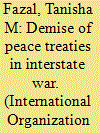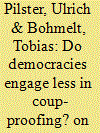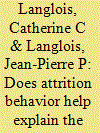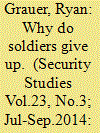| Srl | Item |
| 1 |
ID:
124384


|
|
|
|
|
| Publication |
2013.
|
| Summary/Abstract |
The conclusion of peace treaties following war was a norm of international politics for millennia. Since approximately 1950, however, the rate at which interstate wars have ended with a formal peace treaty has declined dramatically. I argue that the costs of concluding peace treaties have risen with the development of the modern canon of the law of war. Using an original data set, I find that states today prefer to avoid admitting to a state of war and risk placing their leaders and soldiers at risk of punishment for any violations of the law of war.
|
|
|
|
|
|
|
|
|
|
|
|
|
|
|
|
| 2 |
ID:
117848


|
|
|
|
|
| Publication |
2012.
|
| Summary/Abstract |
The existing literature on military effectiveness established the robust claim that democracies are more successful and effective in winning interstate wars. One mechanism that explains this relationship heavily draws upon the underlying effect of regime type on civil-military relations. Still, this relationship has not yet been explored systematically, and rigorous empirical research on this issue remains surprisingly scarce. In order to address this shortcoming, this study investigates the patterns of civil-military relations according to different regime types, that is, democracies and nondemocracies. More specifically, the authors examine whether and how democracies invest in coup-proofing, that is, strategies employed to prevent the military from seizing power. The main argument is derived from a principal-agent logic and claims that coup-proofing is both a relatively less attractive and necessary instrument for democratic principals. By analyzing newly compiled time-series cross-sectional data on states' coup-proofing efforts in 1975-1999, the core hypothesis is tested in a quantitative framework.
|
|
|
|
|
|
|
|
|
|
|
|
|
|
|
|
| 3 |
ID:
092341


|
|
|
|
|
| Publication |
2009.
|
| Summary/Abstract |
Does attrition behavior, defined as waiting for the other side to give in despite the costs of delay, help explain the duration of interstate wars? To answer this question we develop a war and bargaining model that integrates a dynamic progression of the war and allows the rivals to make offers at any time of their choosing while they fight. The model predicts that, in equilibrium, states choose to fight without making significant offers in the hope that the other side will give in to outstanding demands. The model also predicts that each side's flow cost of war increases with the probability that the other side gives in to its demands. This is the testable consequence of attrition behavior. Our statistical analysis suggests that both challenger and defender include attrition behavior in their conduct of warfare, and that this behavioral element significantly affects the duration of interstate wars.
|
|
|
|
|
|
|
|
|
|
|
|
|
|
|
|
| 4 |
ID:
134009


|
|
|
|
|
| Publication |
2014.
|
| Summary/Abstract |
Surrender, or capitulation to the adversary in combat, can have a significant impact on the duration, intensity, and outcomes of battles and wars. Yet the reasons why soldiers choose to capitulate are not well understood. This article advances a new theory of surrender that argues soldiers are most likely to surrender when they perceive proximate environmental signals leading them to expect humane treatment and a relatively short period of captivity and least likely to give up when those signals lead them to expect abusive treatment and lengthy imprisonment. The model is tested through a detailed examination of surrender rates in World War I and findings indicate that it explains more of the observed variation than do existing theories of capitulation. What little systematic data exists on surrenders during twentieth century interstate wars corroborates these findings. Implications for scholars and policymakers are briefly considered.
|
|
|
|
|
|
|
|
|
|
|
|
|
|
|
|